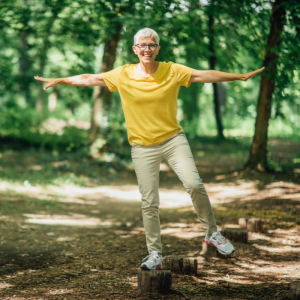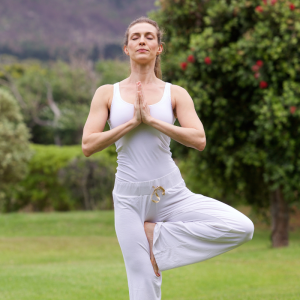 There’s no denying that maintaining balance is important for health. And balance comes in many forms. All this week during my I’m Sweet Enough 7-Day No Sugar Added Challenge, I’ve been talking about blood sugar balance, for example. We know it’s important to have a balanced diet to provide our bodies with adequate nutrients to function optimally. The body itself spends much energy devoted to maintaining homeostasis, which is essentially a fancy scientific word for balance or stability in the face of changing conditions. When you exercise, it’s vital to balance your strenuous efforts with rest and recovery to truly reap the rewards. And finding the right balance between work and home life is key to health and happiness.
There’s no denying that maintaining balance is important for health. And balance comes in many forms. All this week during my I’m Sweet Enough 7-Day No Sugar Added Challenge, I’ve been talking about blood sugar balance, for example. We know it’s important to have a balanced diet to provide our bodies with adequate nutrients to function optimally. The body itself spends much energy devoted to maintaining homeostasis, which is essentially a fancy scientific word for balance or stability in the face of changing conditions. When you exercise, it’s vital to balance your strenuous efforts with rest and recovery to truly reap the rewards. And finding the right balance between work and home life is key to health and happiness.
But there is one type of balance we often overlook. And that is balance in the more literal and physical sense. As in, how long can you stand on one foot without falling over? So let’s talk about why it’s so important to better your balance.
Use it or lose it
We often use this adage to refer to muscle strength, but it is equally apt in referring to balance. In fact, they are related as our balance tends to begin deteriorating at about the same time our muscles do, in our forties and fifties. So we need to train both. As we age, we also lose hair cells in our inner ears. And as our brain integrates signals not only from our eyes but also from our muscles, joints and inner ear structures to help us stand tall, our balance tends to deteriorate as we age.
Your life may hang in the balance
Why should we care about balance? Well, your life (certainly your quality of life) may depend on it. This often-cited study by the UK’s Medical Research Council looked at nearly 3000 men and women aged 53 and evaluated them on several physical capability measures, one of which was how long each could stand on one leg with their eyes closed. Thirteen years later, they analyzed the data again. And they found that those who had stood for two seconds or less on the original test were three times more likely to have died over those thirteen years than those who managed ten seconds or more. This is an association, not a causal relationship. But it does suggest that ability to balance may be indicative of overall health.
Another more recent study looked at one-leg standing time and hip fracture prediction. Three hundred and fifty-one women from 69 to 79 years of age were timed standing on one leg (with eyes open this time) for up to thirty seconds. And they found that with one second longer one-leg-standing-time, the risk of a hip fracture decreased significantly by 5%.
And hip fractures can prove deadly. According to this report from the Government of Canada: “Hip fractures are considered among the most serious fractures in light of the life-threatening complications that often ensue. There were 147 hip fractures per 100,000 Canadians 40 years and older in 2015–2016. Almost one-quarter (22.8%) of those who had a hip fracture died of any cause within the year following their fracture event.”
As we age and our bones become less dense, we are more prone to such fractures. The best way to avoid them is to avoid falling in the first place. And this is one of the key benefits of balance!
Benefits of balance
As mentioned above, one of the key benefits of balance is you are likely to live longer. But here are a few others that impact your quality of life:
- better balance reduces risk of injury,
- better balance increases your mobility so you are more likely to be able to live independently,
- when you feel more steady on your feet and less fearful of falling, you are more likely to be out and about, which improves your cardiovascular health and your mental health (through greater social interaction),
- to maintain balance, your brain must multi-task, integrating signals from your eyes, sensors in joints, muscles and tendons and your balance systems in your inner ear; so there is some indication that challenging your brain in this way (by challenging your balance) can improve cognition.
It is never too late to improve your balance. And it is easy to do. Because each and every time you stand on one leg, your brain is given the opportunity to form neural connections that improve the coordination between your ears, eyes, joints and muscles.
Are you up for a balance challenge?
The good news is that the body loves a challenge! So try this one. Simply stand on one leg with your eyes open. Aim for thirty seconds and work up to a minute (or more). An easy way to remember to do this several times a day is to stack it on top of something you are already in the habit of doing daily.
For example, stand on one leg …
- while brushing your teeth in the morning (and again at night),
- while waiting for the kettle to boil,
- during commercial breaks on the TV or radio (you can get lots of practice this way…just don’t fast forward through them all if you use a PVR),
- while on a telephone call (you can be subtle about it…I’m not talking full tree pose here),
- when you put your shoes on (rather than sitting to do so).
Do it with your eyes closed
 Once standing on one leg with your eyes open is no longer a challenge, try it with your eyes closed. You may be surprised at just how much harder this is. Because your brain doesn’t have the signals from your eyes to help, it must rely more on proprioception (the signals from your muscles, joints and tendons). If you are over fifty and can stand on one leg with your eyes closed for more than ten seconds, you are doing better than average.
Once standing on one leg with your eyes open is no longer a challenge, try it with your eyes closed. You may be surprised at just how much harder this is. Because your brain doesn’t have the signals from your eyes to help, it must rely more on proprioception (the signals from your muscles, joints and tendons). If you are over fifty and can stand on one leg with your eyes closed for more than ten seconds, you are doing better than average.
Of course, tight-rope walking, yoga and tai-chi are awesome ways to better your balance. But they aren’t for everyone and they may take considerably more time out of your day. So, to help keep overall life balance, just try these simple hacks I’ve mentioned instead. Only ten to sixty seconds, two or three times a day, could save your balance and your life.